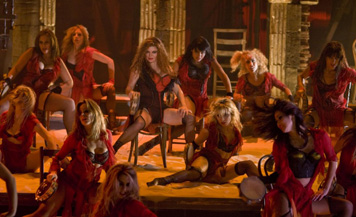|
|
What Went Wrong: NineBy Shalimar SahotaApril 28, 2011
For example, Fergie’s Be Italian sounds great, but it doesn’t explain much about her character Saraghina, nor Guido’s. Apart from the song, she has no lines. The character may be an integral part of the story in the Broadway musical, but it feels like she’s been slipped into the film as an excuse to have Fergie perform the song, than to get her to act. It's a similar situation with Kate Hudson’s Cinema Italiano, which is a good song. Hudson sings it well (yes, she does), but it feels more like a self-contained music video than an essential part of the film. Even though they are the two most memorable songs, they’re sung by minor characters we know so little about and they don’t push the film forward. During its release, Nine was lost amid the bigger blockbusters. Though I feel the film would have faltered if it opened any time of the year, the release date change was a strange move, and most likely suffered more because of it. If The Weinstein Company was expecting Nine to work as counter programming against the likes of Avatar, Sherlock Holmes and that Alvin sequel, it didn’t work. I remember when Nine opened, and I was split between it and Sherlock Holmes. I watched Sherlock Holmes. As well as Marshall’s own Chicago, the revival of the musical has seen hits out of Moulin Rouge!, Mamma Mia! and Hairspray. While they may have the odd downbeat moment, they’re mostly fun, funny and at times uplifting. Nine is the complete opposite; a deeply serious multi-layered musical about a guy going through something that resembles a mid-life crisis, and ruining his marriage in the process. Fair play to Marshall for giving it a go, but it just didn’t connect with audiences, nor critics, for the reviews were terrible. Personally, I think taking the Broadway musical and reworking a film told from Luisa’s point of view might have made for a more interesting story (musical or not) - but I doubt anyone would want to take on a risky venture like that.
[ View other columns by Shalimar Sahota ]
[ View other What Went Wrong columns ]
[ Email this column ]
|

|
|
|

|
Friday, November 1, 2024
© 2024 Box Office Prophets, a division of One Of Us, Inc.


